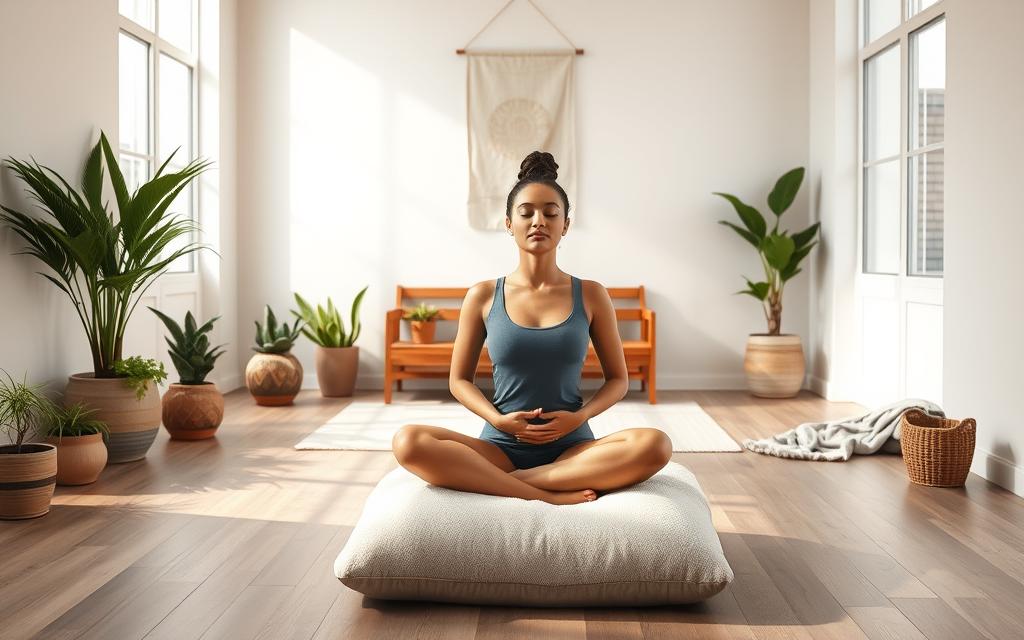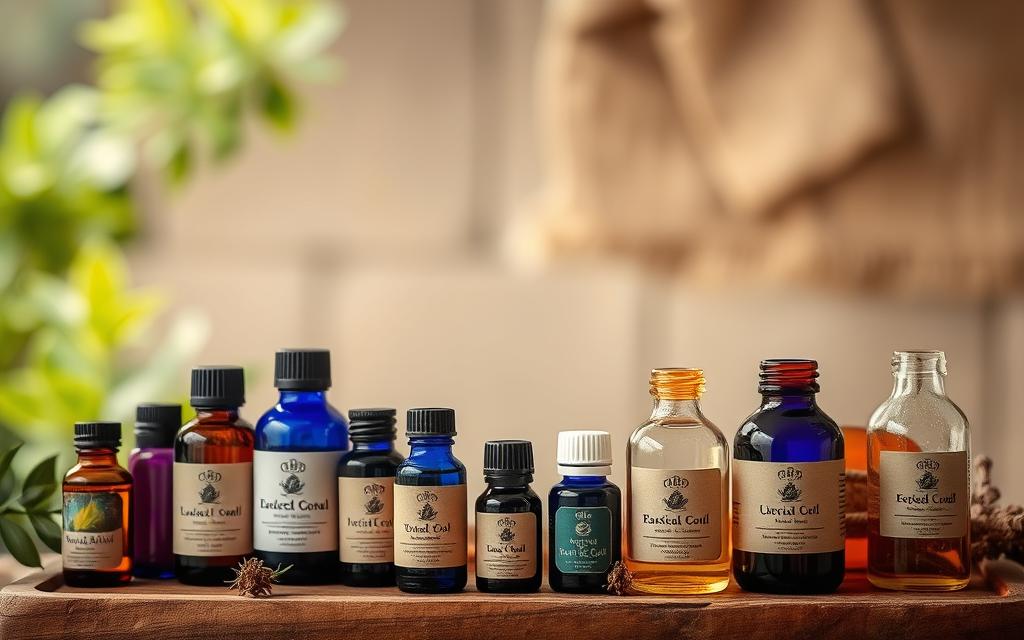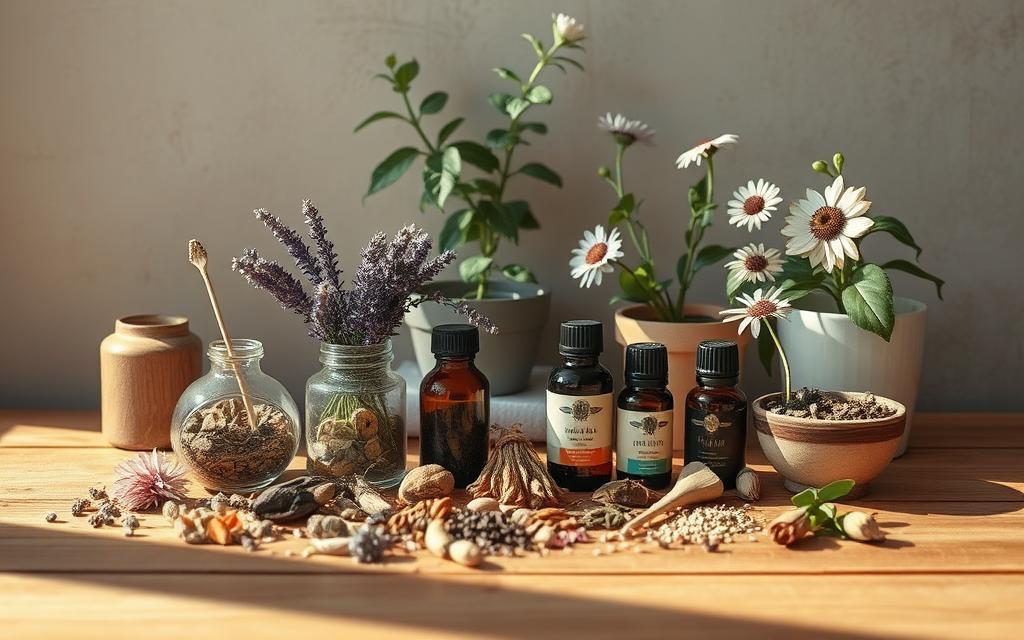Stress can feel like a constant shadow, making our lives feel tight and overwhelming. In today’s fast-paced world, it’s easy to get lost in the endless demands. But, what if we could find a way to heal and find peace within ourselves? Using natural remedies can help us connect with our bodies and minds, avoiding the negative effects of drugs.
Let’s dive into the top five natural ways to ease stress and improve our well-being. We’ll look at how exercise, meditation, and mindfulness can help us find calm. These practices tap into nature’s power to reduce stress1. It’s time to take back our peace and find what works best for us.
Key Takeaways
- Natural remedies offer holistic solutions for managing stress.
- Exercise is proven to significantly reduce anxiety symptoms.
- Meditation can enhance mental clarity and emotional stability.
- Aromatherapy with essential oils can promote relaxation.
- Journaling provides emotional clarity and lessens mental distress.
Understanding Stress and Its Effects
Stress is a natural response to challenges and pressures. It can change our body’s state, triggering the “fight or flight” response. Long-term stress can cause serious health problems like anxiety, heart issues, and a weak immune system. It’s key to understand stress and its wide-ranging effects.
Research shows that about 19% of U.S. adults deal with anxiety each year, often due to stress2. Knowing what causes stress helps us spot it in our lives. This knowledge lets us find ways to manage stress and improve our health.
Exercising is a great way to fight stress. It releases endorphins, boosting our mood3. Eating right, with lots of fruits and veggies, also helps our immune system. Relaxation techniques like meditation and yoga can calm our minds and improve our well-being3.
Our daily choices greatly affect our mental and emotional health. Understanding stress helps us know when we need help and find better ways to cope. By exploring what makes stress worse, we can lead a calmer life.
Common Symptoms of Stress
Stress affects us more than we think. It’s important to know the signs of stress to keep our minds and bodies healthy. Symptoms like headaches, muscle pain, and tiredness can really slow us down4.
Other signs include chest pain, stomach troubles, and trouble sleeping. These show our body is under a lot of stress4.
Feeling too anxious or restless is common. It can make us lose motivation and focus4. Some people might forget things or feel overwhelmed, leading to anger or sadness4.
Others might eat too much or too little as a way to cope4.
When we see these signs, it’s key to talk to others. Getting support from friends or family can help us relax5. Activities like yoga or deep breathing can also improve our mood5.

Living a healthy life is crucial. Eating well and sleeping enough can help manage stress5. By recognizing these signs, we can take steps to improve our mental health and find balance in life.
Natural Remedies for Stress Relief
We can find many natural ways to handle stress. Activities like exercise, meditation, and using essential oils are great. They help our minds and bodies relax and feel better. Studies show that exercise can help by releasing happy chemicals and taking our minds off worries6.
Adding these natural stress remedies to our daily lives can greatly improve our well-being.
Overview of Effective Solutions
Good stress relief often involves a mix of practices. For example, herbal teas like chamomile can help with anxiety6. Aromatherapy, with oils like lavender, can also boost our mood and reduce anxiety7. CBD oil might help with anxiety too7.
Mindfulness, including meditation and deep breathing, can calm our minds and improve focus7.
Integrating Natural Remedies into Daily Life
To make natural remedies work, we need to be consistent. Setting regular times for activities like exercise or meditation helps. Small changes, like using essential oils at home, can also help us stay on track.
Eating foods full of magnesium and omega-3s is important for our mental health. These nutrients help with anxiety, making a healthy diet crucial for living well8. It’s important to find what works for us and build lasting habits for better stress management.

Exercise as a Stress Reliever
Physical activity is great for reducing stress. It’s a natural way to feel better. Different workouts can help us find what works best for us.
The Benefits of Physical Activity
Exercise makes us feel good by releasing endorphins. These chemicals make us happy and reduce pain9. It also improves our heart, digestion, and immune system9.
Regular exercise is like meditation. It helps us focus on movement and breathing. This reduces daily stress9. It can even help with headaches and stomach problems10.
Types of Exercises to Consider
There are many exercises to choose from. Walking, running, and yoga are popular for their calming effects10. In fact, 14 percent of people exercise to cope with stress, with walking being the top choice for 29 percent11.
Even just five minutes of aerobic exercise can help with anxiety11. Exercise also improves sleep, which reduces stress. It’s good for our overall well-being10.

Meditation and Mindfulness Practices
Meditation and mindfulness are key to managing stress well. They help reduce stress, anxiety, and depression. They also improve attention, sleep, and mood12.
There are many meditation techniques to choose from, like guided meditation and focused breathing. Daily mindfulness exercises, like noticing our senses or doing a body scan, help us stay in the moment12. Adding these to our daily routine boosts our emotional strength and makes it easier to handle stress13.

Practicing mindfulness for about six months makes it a regular part of our lives12. Regular meditation clears our minds and brings peace. It lowers our heart rate and blood pressure, showing we’re less stressed13. Mindfulness meditation is easy to do anywhere, making it very appealing13.
Different meditation styles, like Mindfulness-Based Stress Reduction (MBSR) and Transcendental Meditation, offer various benefits14. Combining meditation with a healthy lifestyle improves sleep and overall health14.
The Power of Relaxation Techniques
Relaxation techniques are key for reducing stress. They help us feel better by relaxing our muscles and lowering anxiety. Methods like progressive muscle relaxation and deep breathing help us find peace.
Progressive Muscle Relaxation
Progressive muscle relaxation involves tensing and relaxing muscles step by step. Studies show it can reduce muscle tension and pain, and even improve mood15. It helps us notice when we’re stressed physically. You can do it at home, making it easy for stress relief.
Deep Breathing Exercises
Deep breathing exercises are simple yet effective for stress relief. They involve taking full, deep breaths to calm down. This method activates our calm system16. You can do them anywhere, adding to other relaxation methods like meditation or aromatherapy.
By making deep breathing a part of our day, we can sleep better and feel less angry15. Regular practice builds our ability to face life’s challenges.

Aromatherapy for Stress Management
Aromatherapy is a great way to manage stress with plant-based essential oils. These aromatherapy oils can improve our mood and help us relax. Oils like lavender, chamomile, and bergamot are known to reduce anxiety and boost well-being.
Lavender oil, in particular, is known for its mood-boosting effects and anxiety relief17. These oils can turn our homes into peaceful sanctuaries. They offer natural calming techniques that fit easily into our daily lives.
Essential Oils That Help Relieve Stress
Some essential oils are better than others for stress relief. Lavender oil, for example, can reduce workplace stress and improve sleep18. Chamomile oil helps with sleep and relaxation, while bergamot oil reduces stress and promotes calmness, even in mental health settings18.
Lemongrass oil can also help with anxiety17. Sandalwood and frankincense oils are calming and often used in aromatherapy19.
How to Use Aromatherapy at Home
Using aromatherapy at home is easy. We can start by diffusing essential oils to create a welcoming atmosphere. Adding a few drops of our favorite essential oils for stress to bath water can make bath time more relaxing.
Applying diluted oils to pulse points can also affect our mood directly. Trying different scents can help us find what works best for us19. But, it’s crucial to use essential oils safely. They should be diluted with carrier oils, as they can be harmful if used undiluted, even for those with certain health conditions19.

Herbal Remedies for Anxiety and Stress
We can explore various herbal remedies that serve as effective solutions for managing anxiety and stress. Ingredients like chamomile have shown promise; a study found that taking 1,500 mg daily for 12 weeks can reduce anxiety symptoms significantly20. Ashwagandha has also demonstrated noteworthy effects, with a dosage of 600 mg leading to significantly lower stress levels20. Another beneficial option is valerian, known for modulating GABA receptors in the brain, promoting relaxation and calmness despite a lack of long-term safety data for some populations20.
Passionflower has garnered attention in clinical trials for its potential to alleviate anxiety21. This herb, though often combined with others in commercial products, can be taken as a tablet or liquid tincture. It is usually safe for short-term use, but we must be cautious, as some may experience side effects like dizziness or confusion21. During our research, we found that lavender, with its calming compounds like linalool, can be utilized in various forms, including essential oils and teas20. This diversity in applications allows us to tailor our natural anxiety relief strategies.
Overall, using these herbal solutions wisely can enhance our emotional well-being. It is crucial to consult with healthcare professionals before integrating these remedies into our routine, specially for those who may be pregnant or breastfeeding. Engaging with nature’s offerings can contribute positively to our journey toward managing stress and anxiety.

Creating a Journaling Habit for Clarity
Journaling offers many benefits that boost our emotional health and bring clarity. Just 15 minutes of writing three times a week can help us manage stress and anxiety22. Research shows that daily journaling for 15-20 minutes can lower stress and improve our health23.
Starting with journal prompts or templates can make it more fun and help guide our thoughts22. Writing without stopping lets our thoughts flow, clearing our minds and bringing clarity23. Using prompts can help us explore our emotions, leading to better self-awareness and growth23.
To stay motivated, tracking our progress in a journaling app can be helpful22. Celebrating our achievements, like reaching a journaling milestone, boosts our motivation22. Adding creative elements, like art or photos, can make journaling more enjoyable and rewarding22.
Gratitude journaling helps us focus on the good things in life, improving our emotional well-being23. Creating a cozy space and sticking to a routine makes journaling a rewarding habit. It greatly improves our clarity and stress management skills.

Time Management Techniques to Alleviate Stress
Effective time management strategies are key to feeling less overwhelmed. They help us manage stress better. By prioritizing tasks and organizing our work, we can reduce stress levels. For example, setting goals helps us stay focused and plan better24.
Creating a to-do list helps us keep up with our tasks. We should tackle urgent tasks first. Breaking big projects into smaller steps also helps us avoid feeling overwhelmed25. It’s important not to overcommit ourselves to avoid too much pressure25.
Sorting tasks into urgent and non-urgent categories helps us manage our time better. Taking breaks during the day can refresh our minds and boost productivity24. Also, managing emails wisely can save time and reduce stress.
Using online tools like a color-coded calendar can improve our organization. Combining these methods with stress relief resources can help us manage time and stress better24. Practicing mindfulness and meditation can also help us deal with stress26.

Connecting with Nature as a Stress Reliever
Embracing nature therapy is a great way to find stress relief outdoors. Walking in parks or gardens can lower stress hormones in just twenty minutes27. Activities like identifying plants and wildlife can deepen our connection with nature. Apps and books can help us enjoy this exploration27.
Studies show many benefits from spending time in nature. A walk in the woods can fight depression, and 120 minutes a week can boost our health28. Outdoor workouts also reduce anxiety better than indoor ones. Being active outside improves our mood and reduces negativity28.
Watching animals like birds can bring joy and positivity. Even listening to nature sounds can lift our mood and reduce anger27. If we can’t go outside, nature videos or audio can still offer comfort.
Time in nature lets us enjoy its beauty and feel connected to the world, which is key for mental health28. It also sharpens our problem-solving skills by 50%, making us feel refreshed and clear-minded28.
The Role of Social Connections
Strong social connections are key in fighting stress. People with good social ties live longer and feel better mentally than those who are alone2930. Being around friends, family, or community members makes us feel connected and supported.
Being alone can harm our health a lot. Loneliness is as bad as smoking 15 cigarettes a day29. It’s not just how many friends we have, but the quality of those relationships that matters. Sharing experiences with others can help us feel lighter and see things from new angles.
Also, social connections can lower body inflammation. For instance, ovarian cancer patients with strong support had less inflammation29. Group therapy and peer support improve mood and well-being30. Building strong social networks is vital for our mental and emotional health, helping us manage stress better.
Conclusion
Natural remedies for stress relief offer a holistic way to improve our well-being. We’ve looked at methods like exercise, meditation, and aromatherapy. These can help reduce stress and enhance our life quality.
About one-third of adults in the U.S. use natural remedies, but many don’t tell their doctors. This shows we need to talk more about these methods for better health31.
By adding these practices to our daily lives, we connect with ourselves and nature more deeply. Using garlic for cholesterol support or green tea for heart health shows natural remedies’ power32. Our dedication to learning about these therapies helps us make smart choices for our lifestyle31.
Overall, natural remedies suggest a balanced way to live healthier and fight stress. We encourage you to try these methods and see how they can make your life better.
FAQ
What are some effective natural remedies for stress relief?
Natural remedies for stress include exercise, meditation, and aromatherapy. Herbal remedies and journaling also help. These methods support well-being and stress management.
How does exercise help in reducing stress?
Exercise boosts mood with endorphins. It also lowers anxiety and improves health. This makes it a natural stress fighter.
What types of meditation practices can I try?
Try guided meditation, focused breathing, and mindfulness. Each can help control thoughts and lower stress.
How can aromatherapy support stress management?
Aromatherapy uses calming essential oils like lavender and chamomile. Diffusing these oils or applying them can make your space peaceful and uplift your mood.
Are there any herbal remedies that can help with anxiety?
Yes, herbs like chamomile and valerian calm the mind. But, talk to a doctor before using them to avoid side effects.
What should I include in my journaling practice for stress relief?
Write down your thoughts and what you’re thankful for. Reflecting on your day can clear your mind and reduce anxiety.
How can time management techniques help alleviate stress?
Good time management reduces stress by organizing tasks. Prioritize and break down big projects. Saying no and setting limits also help keep life balanced.
Why is connecting with nature beneficial for stress relief?
Nature lowers stress and boosts well-being. Activities like hiking or walking in parks help us feel grounded and emotionally balanced.
How do social connections impact stress levels?
Good social connections protect against stress. They offer emotional support and help us share experiences. This keeps us grounded during tough times.
Source Links
- 10 natural remedies for reducing anxiety and stress – https://www.medicalnewstoday.com/articles/322396
- 12 tips to tame stress – https://www.mayoclinic.org/healthy-lifestyle/stress-management/in-depth/stress-relievers/art-20047257
- Stress: Causes, symptoms, and management – https://www.medicalnewstoday.com/articles/145855
- How stress affects your body and behavior – https://www.mayoclinic.org/healthy-lifestyle/stress-management/in-depth/stress-symptoms/art-20050987
- Stress Symptoms, Signs, and Causes – HelpGuide.org – https://www.helpguide.org/mental-health/stress/stress-symptoms-signs-and-causes
- Natural Remedies to Alleviate Anxiety – https://www.webmd.com/anxiety-panic/natural-remedies-for-anxiety
- Natural remedies for anxiety – https://www.bbcgoodfood.com/health/wellness/natural-remedies-for-anxiety
- 7 Natural Remedies for Stress Relief – Moon Juice – https://moonjuice.com/blogs/tips-and-tricks/7-natural-remedies-for-stress-relief?srsltid=AfmBOop6O5PUj8khGLdRsh9xKIDiJ3XhoaRXqbS1SZZU2bw6pPCgR3OB
- Exercise and stress: Get moving to manage stress – https://www.mayoclinic.org/healthy-lifestyle/stress-management/in-depth/exercise-and-stress/art-20044469
- Working Out to Relieve Stress – https://www.heart.org/en/healthy-living/healthy-lifestyle/stress-management/working-out-to-relieve-stress
- Physical Activity Reduces Stress | Anxiety and Depression Association of America, ADAA – https://adaa.org/understanding-anxiety/related-illnesses/other-related-conditions/stress/physical-activity-reduces-st
- Can mindfulness exercises help me? – https://www.mayoclinic.org/healthy-lifestyle/consumer-health/in-depth/mindfulness-exercises/art-20046356
- A beginner’s guide to meditation – https://www.mayoclinic.org/tests-procedures/meditation/in-depth/meditation/art-20045858
- Meditation to Boost Health and Well-Being – https://www.heart.org/en/healthy-living/healthy-lifestyle/mental-health-and-wellbeing/meditation-to-boost-health-and-wellbeing
- Relaxation techniques: Try these steps to lower stress – https://www.mayoclinic.org/healthy-lifestyle/stress-management/in-depth/relaxation-technique/art-20045368
- Relaxation Techniques for Stress Relief – HelpGuide.org – https://www.helpguide.org/mental-health/stress/relaxation-techniques-for-stress-relief
- The Best Essential Oils for Stress Relief and How to Use Them – https://www.verywellmind.com/essential-oils-for-stress-relief-8740401
- Stressed? These 10 Essential Oils Can Help – https://www.healthline.com/health/mental-health/essential-oils-for-stress
- Can Aromatherapy With Essential Oils Provide Stress Relief? – https://health.clevelandclinic.org/stressed-out-aromatherapy-can-help-you-to-feel-calmer
- Herbs for anxiety: Does it work? Plus 9 calming options – https://www.medicalnewstoday.com/articles/herbs-for-anxiety
- Herbal treatment for anxiety: Is it effective? – https://www.mayoclinic.org/diseases-conditions/generalized-anxiety-disorder/expert-answers/herbal-treatment-for-anxiety/faq-20057945
- How to Build a Journaling Habit That Lasts – https://dayoneapp.com/blog/journaling-habit/
- The Healing Power of Journaling: Techniques for Mental Clarity – https://kcwpsychologicalservices.com/the-healing-power-of-journaling-techniques-for-mental-clarity/
- Easy time-management tips – https://www.nhsinform.scot/healthy-living/mental-wellbeing/stress/6-easy-time-management-tips/
- Stress Management: Techniques to Deal with Stress – https://www.helpguide.org/mental-health/stress/stress-management
- Stress Management: Meditation, Relaxation, Health Benefits – https://my.clevelandclinic.org/health/treatments/6409-stress-management-and-emotional-health
- 7 ways to reduce your stress by enjoying nature – https://www.bhf.org.uk/informationsupport/heart-matters-magazine/wellbeing/ways-to-reduce-stress-by-enjoying-nature
- Spend Time in Nature to Reduce Stress and Anxiety – https://www.heart.org/en/healthy-living/healthy-lifestyle/stress-management/spend-time-in-nature-to-reduce-stress-and-anxiety
- The Connection Prescription: Using the Power of Social Interactions and the Deep Desire for Connectedness to Empower Health and Wellness – https://pmc.ncbi.nlm.nih.gov/articles/PMC6125010/
- Connectedness & Health: The Science of Social Connection – The Center for Compassion and Altruism Research and Education – https://ccare.stanford.edu/uncategorized/connectedness-health-the-science-of-social-connection-infographic/
- Conclusion – Complementary and Alternative Medicine in the United States – https://www.ncbi.nlm.nih.gov/books/NBK83803/
- Home Remedies: What Works? – https://www.webmd.com/balance/ss/slideshow-home-remedies
